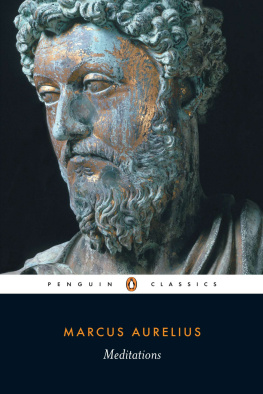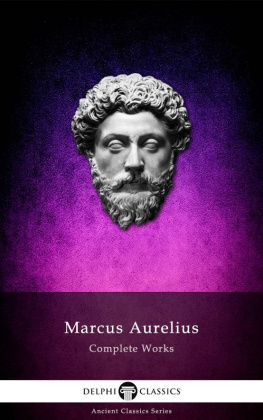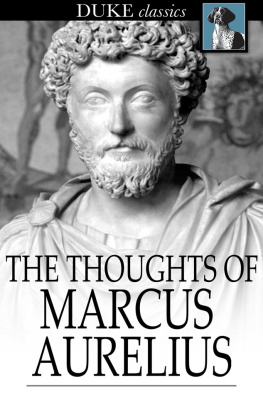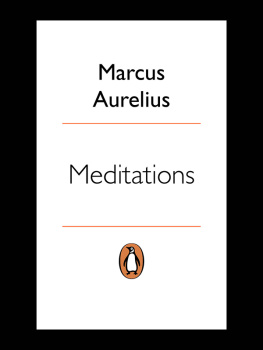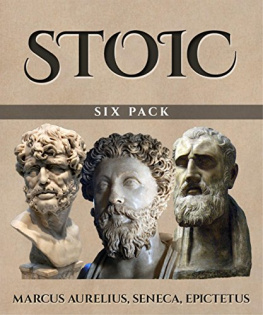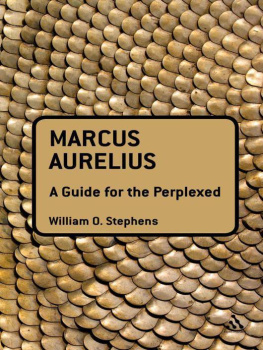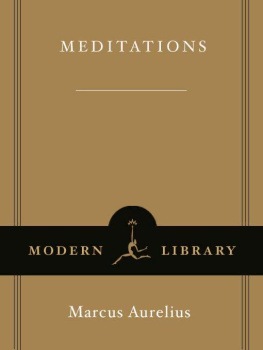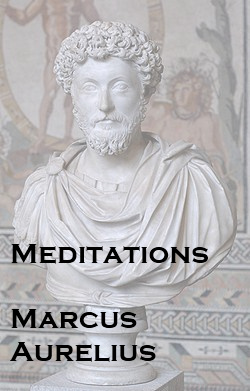Marcus Aurelius - Meditations (tr.Martin Hammond) (Penguin Classics)
Here you can read online Marcus Aurelius - Meditations (tr.Martin Hammond) (Penguin Classics) full text of the book (entire story) in english for free. Download pdf and epub, get meaning, cover and reviews about this ebook. year: 2010, publisher: Penguin Group USA, Inc., genre: Religion. Description of the work, (preface) as well as reviews are available. Best literature library LitArk.com created for fans of good reading and offers a wide selection of genres:
Romance novel
Science fiction
Adventure
Detective
Science
History
Home and family
Prose
Art
Politics
Computer
Non-fiction
Religion
Business
Children
Humor
Choose a favorite category and find really read worthwhile books. Enjoy immersion in the world of imagination, feel the emotions of the characters or learn something new for yourself, make an fascinating discovery.
- Book:Meditations (tr.Martin Hammond) (Penguin Classics)
- Author:
- Publisher:Penguin Group USA, Inc.
- Genre:
- Year:2010
- Rating:3 / 5
- Favourites:Add to favourites
- Your mark:
- 60
- 1
- 2
- 3
- 4
- 5
Meditations (tr.Martin Hammond) (Penguin Classics): summary, description and annotation
We offer to read an annotation, description, summary or preface (depends on what the author of the book "Meditations (tr.Martin Hammond) (Penguin Classics)" wrote himself). If you haven't found the necessary information about the book — write in the comments, we will try to find it.
Meditations (tr.Martin Hammond) (Penguin Classics) — read online for free the complete book (whole text) full work
Below is the text of the book, divided by pages. System saving the place of the last page read, allows you to conveniently read the book "Meditations (tr.Martin Hammond) (Penguin Classics)" online for free, without having to search again every time where you left off. Put a bookmark, and you can go to the page where you finished reading at any time.
Font size:
Interval:
Bookmark:

MARCUS AURELIUS ANTONINUS was born in AD 121, in the reign of the emperor Hadrian. At first he was called Marcus Annius Verus, but his well-born father died young and he was adopted, first by his grandfather, who had him educated by a number of excellent tutors, and then, when he was sixteen, by Aurelius Antoninus, his uncle by marriage, who had been adopted as Hadrians heir, and had no surviving sons of his own. Aurelius Antoninus changed Marcus name to his own and betrothed him to his daughter, Faustina. She bore fourteen children, but none of the sons survived Marcus except the worthless Commodus, who eventually succeeded Marcus as emperor.
On the death of Antoninus in 161, Marcus made Lucius Verus, another adopted son of his uncle, his colleague in government. There were thus two emperors ruling jointly for the first time in Roman history. The Empire then entered a period troubled by natural disasters, famine, plague and floods, and by invasions of barbarians. In 168, one year before the death of Verus left him in sole command, Marcus went to join his legions on the Danube. Apart from a brief visit to Asia to crush the revolt of Avidius Cassius, whose followers he treated with clemency, Marcus stayed in the Danube region and consoled his somewhat melancholy life there by writing a series of reflections which he called simply To Himself. These are now known as his Meditations, and they reveal a mind of great humanity and natural humility, formed in the Stoic tradition, which has long been admired in the Christian world. He died, of an infectious disease, perhaps, in camp on 17 March AD 180.
MARTIN HAMMOND was born in 1944 and educated at Winchester College and Balliol College, Oxford. He graduated in Literae Humaniores in 1966, and since leaving Oxford has taught in England and in Greece. He was Head of Classics at Eton College for six years from 1974, and subsequently Master in College. In 1984 he was appointed Headmaster of City of London School, and thereafter was Headmaster of Tonbridge School for fifteen years from 1990. He is married, with two children. He has also translated The Iliad (Penguin, 1987) and The Odyssey (2000), and is now working on a translation of Thucydides.
DISKIN CLAY is Professor of Classical Studies at Duke University. His BA degree is from Reed College, in Portland, Oregon (1960), and his PhD from the University of Washington in Seattle (1967). He has taught at Reed College, Haverford College, The Johns Hopkins University, The City University of New York, and in France, Greece and Italy. His main publications have been in the field of ancient Greek philosophy. His Lucretius and Epicurus appeared in 1983; Paradosis and Survival: Three Chapters in the History of Epicurean Philosophy in 1998; Four Island Utopias (with Andrea Purvis) in 1999; and Platonic Questions: Dialogues with the Silent Philosopher in 2000. His study of Archilochos Heros: The Cult of Poets in the Greek States appeared in 2004. He is now working on two studies of Dante and his influence: Dantes Parnassus: The Pagan Poetry of the Commedia and The Art of Hell.
MARCUS AURELIUS
Translated with Notes by MARTIN HAMMOND
With an Introduction by DISKIN CLAY
PENGUIN BOOKS
PENGUIN CLASSICS
Published by the Penguin Group
Penguin Books Ltd, 80 Strand, London WC2R 0RL, England
Penguin Group (USA) Inc., 375 Hudson Street, New York, New York 10014, USA
Penguin Group (Canada), 90 Eglinton Avenue East, Suite 700, Toronto, Ontario, Canada M4P 2Y3
(a division of Pearson Penguin Canada Inc.)
Penguin Ireland, 25 St Stephens Green, Dublin 2, Ireland (a division of Penguin Books Ltd)
Penguin Group (Australia), 250 Camberwell Road, Camberwell, Victoria 3124, Australia
(a division of Pearson Australia Group Pty Ltd)
Penguin Books India Pvt Ltd, 11, Community Centre, Panchsheel Park, New Delhi 110 017, India
Penguin Books (NZ), cnr Airborne and Rosedale Roads, Albany, Auckland 1310, New Zealand
(a division of Pearson New Zealand Ltd)
Penguin Books (South Africa) (Pty) Ltd, 24 Sturdee Avenue, Rosebank, Johannesburg 2196, South Africa
Penguin Books Ltd, Registered Offices: 80 Strand, London WC2R 0RL, England
www.penguin.com
First published in Penguin Classics, 2006
1
Translation and notes copyright Martin Hammond, 2006
Introduction copyright Diskin Clay, 2006
All rights reserved
The moral right of the editor has been asserted
Except in the United States of America, this book is sold subject
to the condition that it shall not, by way of trade or otherwise, be lent,
re-sold, hired out, or otherwise circulated without the publishers
prior consent in any form of binding or cover other than that in
which it is published and without a similar condition including this
condition being imposed on the subsequent purchaser
EISBN: 9781101487518
AD 26 April: Marcus born in Rome.
c. 124 Death of Marcus natural father, M. Annius Verus. Adopted by his grandfather.
Adopted (together with Lucius Ceionius Commodus) by his uncle Antoninus, who became emperor in succession to Hadrian on 10 July.
Betrothed to Antoninus daughter Faustina.
Consul for the first time.
Married to Faustina.
Birth of first child.
between 155 and 161 Death of Marcus mother, Domitia Lucilla.
7 March: Death of Antoninus Pius.
Succession of Marcus and Lucius as joint emperors.
31 August: Birth of son Commodus and twin brother.
1667 Plague in Rome and throughout the empire.
16880 Most of these years spent on campaign on the northern frontiers (in central and south-eastern Europe north of the Danube).
Death of Lucius.
Rebellion of Avidius Cassius, governor of Syria, in the east. Death of Faustina at Halala in Cappadocia.
Commodus (aged 15), Marcus only surviving son, made joint emperor.
180 17 March: Died near Sirmium in Pannonia. Succession of Commodus as sole emperor.
In his Meditations, Marcus Aurelius Antoninus describes himself as a male, mature in years, a statesman, a Roman, a ruler.
Marcus father died when he was a boy and he was brought up in the home of his paternal grandfather, named, like his son and grandson, Marcus Annius Verus. The emperor Hadrian (ruled AD 11738) came to know and admire Marcus when he was a young man of seventeen and liked to call him verissimus (most true and truthful), after his cognomen Verus (true). Marcus names and titles (nomina) are an omen of his career as an emperor and a philosopher. His cognomen translates into Greek as alethes, and truthfulness, realism, and honesty, as we will see, were the virtues Marcus admired most. In February of AD 138, just months before his death, Hadrian adopted the man who was to become Marcus adoptive father, Titus Aurelius Antoninus. In turn, Antoninus adopted Marcus that same year. Marcus Annius Verus then took the name and title Marcus Aurelius Antoninus. Antoninus Pius, as he came to be called, ruled from 138 until his death in 161, when Marcus became emperor in his turn.
Some of this history is evident in of the Meditations where Marcus speaks of his debts to those who had raised and educated him and expresses his deep debt to the man who was first his uncle by marriage and then his father. His progress through the major offices of the Roman state (the
Font size:
Interval:
Bookmark:
Similar books «Meditations (tr.Martin Hammond) (Penguin Classics)»
Look at similar books to Meditations (tr.Martin Hammond) (Penguin Classics). We have selected literature similar in name and meaning in the hope of providing readers with more options to find new, interesting, not yet read works.
Discussion, reviews of the book Meditations (tr.Martin Hammond) (Penguin Classics) and just readers' own opinions. Leave your comments, write what you think about the work, its meaning or the main characters. Specify what exactly you liked and what you didn't like, and why you think so.

